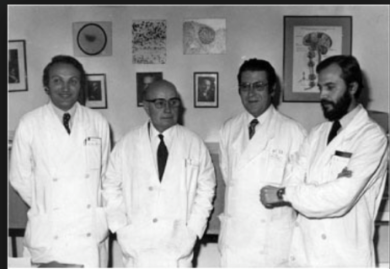Urology
Urology is a medical-surgical speciality that deals with preventing, diagnosing and treating renal morphological diseases, urinary tract and retroperitoneal diseases affecting both sexes, as well as diseases of the male genital tract, with no age limit.
The anatomical field of action includes the kidney and its adjacent structures, the urinary tract, and the male genital tract, attending to dysfunctions of the following organs and structures: adrenal gland, kidney, ureter, bladder, prostate, seminal duct, urethra, pelvic floor structures, penis, scrotum, testicle and epididymis.
Urology encompasses a comprehensive medical and surgical approach to anatomical (organs and systems) and pathological (diseases, syndromes, symptoms and clinical signs) conditions within its scope, addressing patients' issues through a thorough understanding of the speciality.
The urologist has a medical and surgical vision of urinary system diseases in men and women, and of the genital system in men. Urologists have comprehensive understanding of the anatomy, physiology, physiopathology, aetiology, clinical presentation, nosology, diagnostic methods and therapeutic procedures (both medical and surgical) related to the aforementioned organs and systems, encompassing clinical care, scientific research, teaching, and legal aspects.
Service organisation
The joint Urology Department at Hospital Universitario Fundación Jiménez Díaz, Hospital Universitario Infanta Elena, Hospital Universitario Rey Juan Carlos and Hospital General de Villalba is one of the youngest and most promising in the Community of Madrid and possibly in Spain. In any case, this does not imply a lack of experience, since it also counts on professionals with extensive backgrounds.
This characteristic, combined with the high volume of people cared for, gives us exposure to both common and rare pathologies, thereby enabling us to amass considerable experience in managing a diverse range of patients.
We have a highly technical service, with all diagnostic and therapeutic techniques currently found in the urology field.
The digitalisation of patient medical records is important as it considerably improves the comprehensive monitoring of patients and the search for information for healthcare, teaching and research purposes.
Fundación Jiménez Díaz University Hospital offers training for Urology residents.
History
The HUFJD's Urology Service was founded in 1970 by one of the first and most cherished students of Mr Carlos Jiménez Díaz, Dr Luis Cifuentes Delatte (1907-2005), who previously held the post of Head of Service at Hospital Universitario de la Princesa (Madrid) since 1950. Dr Cifuentes Delatte was a man of science, a urologist, and member of the Royal National Academy of Medicine. As Professor of Urology at Universidad Autónoma de Madrid (UAM), he taught the subject and discipline of Urology as part of the Degree in Medicine for over a decade following the university's foundation.
The HUFJD has made significant contributions in healthcare, education, and, in particular, research, in line with the principles of Don Carlos. He left a formidable scientific inheritance, along with a urology school, for his disciples.
Following his retirement in 1974, one such disciple, Dr Carlos Alférez Villalobos (1927-2007), continued as Head of Service (1974-1990). Dr Alférez was an exceptional urologist and surgeon who, along with his highly competent team, adeptly developed the Renal Transplantation technique. He made the HUFJD Urology Service (and the hospital itself) a pioneer in Spain, with a focus on advancing and progressing both cadaver and living donor Renal Transplant programmes. After retiring in 1990, from 2007 onwards the Head of the HUFJD's Urology Department was Prof. Dr Remigio Vela Navarrete, first Professor of Urology at Universidad Autónoma de Madrid (UAM), having previously been an Associate Professor. He is currently an Honorary Academician of the Royal National Academy of Medicine.
Prof. Vela Navarrete always showed great interest and dedication to the pathology of uraemia and renal failure. The implantable artificial kidney research project, which at the time was both valuable and relevant, was based on an experimental animal surgery model involving dogs, which he devoted many years of his life to. He is also renowned for his contributions to the understanding of the pathophysiology and urodynamics of the Upper Urinary Tract (UUT).
Dr Cifuentes' school has been present in all of them. The HUFJD's Urology Service has consistently pursued a professional path, underpinned by healthcare practice, scientific development and teaching.
Following this intense stage spanning almost 40 years, the HUFJD's Urology Service (part of QuirónSalud Group in Madrid since 2008) proudly upholds this rich professional legacy, focusing on three key structural aspects: CLINICAL CARE, TEACHING and RESEARCH. A new generation of urologists from other Spanish Urology schools now make up the renewed Urology Service, with Dr Carmen González Enguita as the Head of Service. A new, modern Urology Department is being developed under her leadership, with a commitment to integrating and leveraging knowledge and expertise from previous stages. This new team enthusiastically incorporates the latest knowledge, scientific advancements and complex technological equipment offered by Urology in Spain, Europe and around the world, providing a quality response to increasing healthcare demands of Madrid society today.
The Urology Service at HUFJD has evolved into an exceptional team. QuirónSalud Group (Madrid) works in the Hospital Network, in line with the public healthcare philosophy and culture. The UroRed network is made up of over 40 urologists (2018*) working at one of the Group's four public hospitals, ensuring a coordinated interrelationship. It is currently the largest Urology Service in the Community of Madrid. Despite the service's apparent youth, the team is firmly committed and holds a prominent position in Madrid's clinical and healthcare system. With a wealth of experience, it has healthcare professionals with a long career history, promoting generational change and the transition to modern, technologically advanced Urology at the forefront of the field.
Alongside its valuable human team, the HUFJD's Urology Department recognises that patients are its greatest asset. This opportunity for extensive clinical care enables swift, substantial access to both the most common and also the rarest, most infrequent urological pathologies. The team therefore becomes highly skilled in the different areas of knowledge with relative ease. This training has enabled the Service to gradually integrate the most cutting-edge, diverse and innovative techniques over recent years, in tandem with the most advanced diagnostic and therapeutic technology.
As a working tool, the electronic medical record is a constantly evolving entity, undergoing continuous improvement and updating in response to the care demands and needs of healthcare professionals (users) working with it. It greatly simplifies the process of gathering data, finding information, and globally tracking the patient for the purposes of care, teaching, and research.
The Urology Service's Teaching Unit, with its distinguished, solid background coupled with a dynamic, renewed team, is therefore an excellent place to develop the speciality.
It is in the privileged, fortunate position of being able to provide optimal Urology training for medical residents interested in the speciality, currently offering one place per year. Each year, a single medical resident benefits from comprehensive, exclusive training during his or her internship, covering both clinical care and opportunities in teaching and research. Continuous and ongoing mentoring guarantees the closest form of training.
For a multitude of reasons (along with other more intangible, human reasons yet to be discovered), the HUFJD's Urology Department offers an exceptional service with high teaching capacity, presenting a significant opportunity for medical and urological training.
*The Urologists in the UroNet network are from the following hospitals:
- Hospital Universitario Fundación Jiménez Díaz (HUFJD). Universidad Autónoma Madrid (UAM)
- Hospital Universitario Infanta Elena (HUIE). Universidad Francisco de Vitoria (UFV)
- Hospital Universitario Rey Juan Carlos (HRJC). Universidad Rey Juan Carlos (URJC)
- Hospital Universitario de Villalba (HUCV). Universidad Alfonso X el Sabio (UXS)
Files

Urology Service. From left to right: Remigio Vela Navarrete, Luis Cifuentes Delatte, Carlos Alférez Villalobos and Enrique García de la Peña
Hospital Universitario Fundación Jiménez Díaz
Avda. Reyes Católicos, 2
28040 Madrid Madrid
© 2026 Quirónsalud - All rights reserved
























